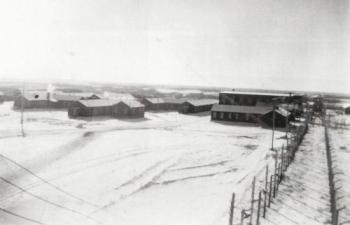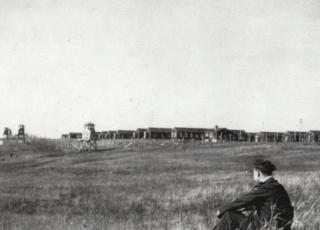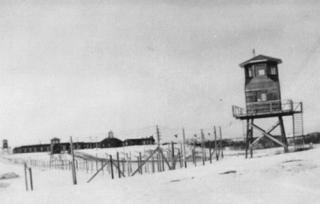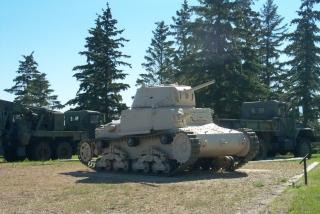- — On This Page —
- • Administration
- • Routine
- • Prisoners
- • Post War
- • Appendix
Internment Camp 135
January 1945 to June 1946
Administration
Pages 37-44 excerpted from Transitions by Marsha Scribner
Adjutants
Capt. R. G. Ashbury
January 1945 - January 1946
Capt. S. F. Dunlop
January 1946 - June 1946
Commandants
Lt. Col. C. G. Bradshaw
January 1945 - December 1945
Major W. R. Shanks
December 1945 - April 1946
Lt. Col. W. Storm
April 1946 - July 1946
Headquarters staff also included: a quarter master, a works officer, a company staff and transport officer, an accounts officer, a medical officer, and an intelligence officer.
Guard
The Victoria Guard of Canada (VGC) guarded Internment Camp 135. There were four separate companies throughout the eighteen months of its operation. They are as follows:
Coy. No. 36:
January 1945 - April 1945
Coy. No. 30:
April 1945 - August 1945
Coy. No. 26:
August 1945 - November 1945
Coy. No. 27:
November 1945 - June 1946
Preparations
The first members of the staff to arrive in early January 1945 were Adjutant Capt. Ashbury, Commandant Lt. Col. Bradshaw and Quarter Master Capt. Sgt. G. D. Clarke. As accomodation was still pending, they roomed at the Wainwright Hotel.
The first two weeks demanded organization of the camp, requisition of supplies and preparation of buildings to house personnel, guards, and prisoners.
By January 10th, 150 engineers and 40 civilians were working on enclosure wire and lights. Five feet of frost made post hole digging extremely difficult. Watch towers were erected in strategic positions. By the 15th quarters were available for the officers but no cook. Moving pictures were shown three times weekly, first noted films being: “The Great Moment,” “The Heavenly Body,” and “Charlie Chan in the Secret Service.” Sunday church services were held for both Roman Catholic and Protestant worshippers.
In the first weeks of preparation, one HQ staff member died as a result of an accident: Pte. W. J. Flamand.
On Monday morning January 29, 1945, the first 523 POWs arrived by train escorted by No. 36 Coy. VGC to begin an eighteen month segment of Camp Wainwright’s history.
- Related Story:
- Some Random Memories of Wainwright
- Related Link:
- NFB Film - The Enemy Within
Routine

The routine in Internment Camp 135…
…was similar to others in that the prisoners were counted at least twice daily, inspections of their quarters done weekly or at random.
Prisoners selected a spokesman who met with the Camp Commandant regularly expressing concerns of the prisoners. The spokesman mentioned in the War Diary of this camp was Col. Hauck. There seemed not to be serious complaints of any kind, laundry service from Edmonton, bedbugs, mail, and length of parole walks were the only discussions recorded in the War Diary.
A representative of the Swiss Consul frequently visited the camp passing on his information to the German government, as to the conditions of the prisoners. He was also a mediator with the laws of the Geneva Convention as his guide. Correspondence between POW spokesman and the Swiss Consul concerning particular grievances at the camp is on record and stored at the Government Archives in Ottawa.
Fire drills were practised often, both prisoners and staff manning the equipment. No major fire was reported in the Diary but several smaller ones were contained quickly.
Arrivals and departures of prisoners required thorough baggage searches done by Military Police. This often proved a lengthy procedure. There may have been restricted items confiscated during these searches but none are stated in records obtained from the Archives.
Medical and dental inspections were necessary for incoming and outgoing prisoners. The dental records were primarily for identification purposes, sometimes determining an impersonator amongst the prisoners. RCMP were involved with ID practices which also included photos.
Being a newly established camp, problems with furniture, supplies, vehicles and personnel requirements were inevitable. The VGCs stationed there, helped out when personnel shortages slowed operations. Staff shortages were a concern during the first summer, as many were released with Compassionate Discharge and replacements gradually arrived to ease the work load.
When word arrived that fighting had ended in Europe, camp routine relaxed somewhat, allowing the prisoners and staff more recreation time.
Medical
There was a hospital and medical officer at camp to manage the usual infirmities encountered in an establishment of this size.
On March 6, 1945, the first POW medical attention was necessary, one prisoner suffering acute appendicitis. He was refused admittance to the Municipal hospital in Wainwright so underwent successful surgery by the M.O. at the camp hospital. Nurses from town volunteered assistance and instruments.
Most future medical emergencies, staff and POW, were transported to Edmonton. This included more appendicitis attacks, various other medical needs, and one POW who slashed his wrist.
Staff Recreation
Apart from daily routine the staff an guard enjoyed leisurely activities in Camp and Town. Movies and bingo were supplied at the camp. Swimming was available in lakes and rivers within the camp boundaries.
The Board of Trade arranged various activities to entertain the troops including hostess dances, Sunday evening singsongs at the Legion Hut, sports days, and other athletic challenges. Baseball and horseshoes were favorite summer sports. Curling and hockey filled the winter schedule. These competitions spread from Wainwright to Viking, Irma, Chauvin and Edgerton.
“Lifebuoy Follies,” Lever Brothers Road Show, performed at camp May 15, 1945. The cast was later entertained at the officers’ mess.
Prisoners

The majority of prisoners…
… at Internment Camp 135 were German officers. Some understood and spoke English however an interpreter from HQ staff was available at camp.
When the first prisoners arrived in January 1945, winter weather seemed the biggest difficulty. The quarters were extremely cold, initiating frustrating problems with water lines and heaters. However, once the internees were settled in their temporary lifestyle, they began to make the best of it.
To pass the long winter hours, the prisoners tried to surround themselves with memories of home. They decorated their mess halls with paintings of German design; a library was begun, books repaired, rebound and recovered; Gramophone records brought to camp by the prisoners were played sometimes bringing tears to the eyes of homesick husbands, fathers, sons and sweethearts.
Handicraft materials were supplied to an extent, resulting in various exquisite creations by talented craftsmen. (Some of these are on display at the local Wainwright and District Museum located in the old train station.)
When the announcement in May 1945 confirmed hostilities had ceased in Europe, some restrictions were lifted and more activities for the prisoners were allowed.
A band was formed and entertained on several occasions in the camp theatre. Parole walks were extended and sports competitions began amongst the prisoners. Outdoor activities increased as the POWs assisted in beautifying the grounds. Cinders were collected and spread on roads, driveways and walks. Gardening, laying sod, planting shrubs and sowing grass seed kept many hands busy throughout the summer. These chores were shared by the army personnel as well.
Some of the German tunes the prisoners may have hummed while they worked and walked could have been: "Wir fahren gegen England", "Bomben auf England", or "Lili Marlene".
Kitchen duties, quarters clean-up, reparation of personal clothing and boots, and basic personal hygiene were everyday duties for those interned.
In the fall of 1945 a clothing depot was iin operation at the camp, run by 75 POW volunteers. Baling and packaging were done at the drill hall, shipments leaving by train on their way to war ravaged Europe.
At Christmas 1945, carols and music by the POW band entertained staff and guests. The POW leader expressed his thanks for treatment received in Canada.
Occurrences to Alter Routine
On February 11, 1945 as 245 additional POWs arrived by train, guard was increased; one prisoner had attempted an escape enroute to Wainwright. Treatment of this particular prisoner generated much correspondence between the prisoners’ spokesman, the Swiss consul and the Director of Internment Camps in Canada. The officer in question had previously attempted escape and it was felt he should be handcuffed to lessen chances of this occurrence being repeated. He also had to serve a detention upon arrival at Wainwright, as a disciplinary action ordered by the Camp Commandant. Other than some minor technicalities, the action did not contravene the laws of the Geneva Convention and the matter was eventually dropped.
Another escape endeavor involving Lt. E. Meuche and Lt. K. Conrad resulted in success the following month. The enterprising escapees had enlisted a tailor from their ranks to design uniforms (coveralls) from mattress covers for the occasion. Dressed in these, and toting wire spools, they casually left the enclosure while sentires watching from the towers assumed they were army engineers of the fencing crew. When a count was called by Commandant Lt. Col. Bradshaw, the prisoners were uncooperative, delaying the procedure by an entire day. When finally they agreed to a count, it was discovered which men were absent and the inevitable paperwork began. About a month later the two were apprehended in Gary, Indiana and were sent to Gravenhurst rather than being returned to Wainwright.
A surprise search of POW quarters on April 27, 1945 disclosed an eight foot deep shaft entering an incomplete twenty foot tunnel below Hut #18.
POW spokesman requested removal of one prisoner who felt his life was in danger. The Commandant complied, having the German officer escorted to an alternate camp.
It is noted that bombs from previous training exercises were found by prisoners on parole walks.
May 8, 1945: Camp was notified the war was officially over in Europe following Hitler's suicide the week prior. At 1000 hours on this day, the Adjutant, Commandant, Intelligence Officer, Interpreter Officer and Quarter Master entered the enclosure. A proclamation was read to the prisoners, first in English, then interpreted to German. The news was received quietly by the internees, who knew it would be yet a long wait before returning to their homeland.
To celebrate the war’s end, a Civilian Parade was held in the Town of Wainwright. The pipe band of No. 30 Coy. VGC led the parade with pride.
Later on that month, the VGC celebrated their fifth anniversary. Empire Day resulted in a spledid event arranged by Camp and Town officials, the Master of Ceremonies being Lt. J. M. Burden. A morning parade led again by the pipe band, made its way from the train station down Main Street to the post office, where Lt. Col. Bradshaw took the Salute. The afternoon was reserved for a community picnic with baseball, contests, and refreshments. Soft drinks, hot dogs and ice cream were free to all children. Prizes were handed out to winners of events prior to the picture show in the evening. This event proved the commitment of camp and community to become partners in unison.
Two young soldiers A.W.O.L. New Years Eve, were brought back to camp under escort January 8 and awarded fouteen days detention.
Lt. Col. Bradshaw died February 18, 1946 after a long illness. Capt. Peter Reid escorted the body to Winnipeg and represented Camp at the funeral.
A shooting occurred in Guard Unit lines on April 27, 1946 resulting in the death of Pte. Long, No. 27 Coy. VGC. Details were not supplied in War Diary records.
May 25, 1946 was declared a holdiday in camp, due to the busy day before when the last of the POWs left Wainwright.
Post War

A Casualty of Post War
On April 27, 1946 with internees in Canada now returning to Europe, 28 year old POW Lt. Gunther Mohring committed suicide. He was found hanging in a copse of trees near the Buffalo Park Gates in the northern area of the camp. The lieutenant had written a note before leaving on his parole walk that day, indicating his intentions as he felt he had nothing left to live for. It is said he received a “Dear John” letter from his overseas sweetheart. Finding this too much to bear, having survived being imprisoned in this foreign country and so dependent upon his memories of his fraulein, he took his life.
After a German military funeral, Lt. Mohring was buried with military honors at the Wainwright cemetery. In 1971, Mohring’s body was exhumed and transferred to Kitchener, Ontario, as were the remains of any POWs who died and were buried in Canada during the war years. His grave marker is in the local museum in Wainwright.
Exodus of Prisoners
In February 1946 the first group of prisoners left Wainwright. Some POWs were placed on farms (not near Wainwright) to work prior to their return. Others were sent to England to await repatriation. Still others were returned directly to Germany.
On May 24, 1946, one year after the proclamation of peace was read to the prisoners, the camp spur line guided the final car of POWs away from Internment Camp 135.
Closure of Internment Camp 135
The sixth anniversary of the VGC was acknowledged but not celebrated on May 24 of 1946 due to the removal of the POWs that day. Orders to reduce the camp to nil strength by June 14 were received and disbandment procedures began immediately.
Collection and storage of ordnance stores were planned and work started on the enclosure with damages to the POW barracks reported as being minimal. Some of the personnel were notified of Overseas Escort Duty for mid June, others received re-posting instruction.
The last entry in the War Diary of Internment Camp 135, Wainwright was June 14, 1946 stating, “Weather clear and warm. Internment Camp 135 and No. 27 Company, Veterans Guard of Canada were reduced to ‘Nil’ Strength.” signed by Lt. Col. W. Storm, Camp Commandant.
Thus ended another era of Camp Wainwright’s development, the camp now having several permanent structures and up to 160 square miles of training grounds. Its fate was yet undecided with only the Cattalo experimental farm and community pasture grazing utilizing the area. No military activity took place until 1947.
Appendix
| Month End | POW | HQ Personnel |
|---|---|---|
| Source: Transitions; pp.44 | ||
| 1945 | ||
| January | 523 | 35 |
| February | 769 | 41 |
| March | 766 | not stated |
| April | 1092 | 63 |
| May | 1090 | 64 |
| June | 1086 | 60 |
| July | 1068 | 61 |
| August | 1060 | 63 |
| September | 1060 | 78 |
| October | 1066 | 79 |
| November | 1066 | 99 |
| December | 1063 | 91 |
| 1946 | ||
| January | 1063 | 98 |
| February | 956 | 89 |
| March | 884 | 68 |
| April | 816 | 69 |
| May | nil | 66 |
| June | nil | nil |
Related Pages
- Related:
- Camp 135
- | The Enemy Within
- | Leo Hamson
- | We Meet Again
- | Homefront
- • Top •
- The Camp Wainwright Story
- | Home
Photos courtesy of Erika Foley
© 2004-2010- • Reviewed on 2010-08-15
- • from my ten fingers to the web